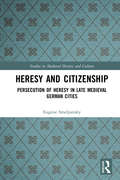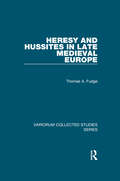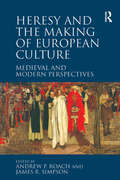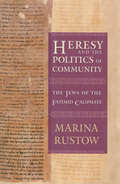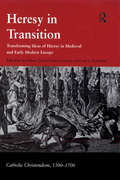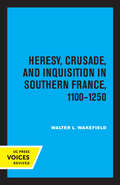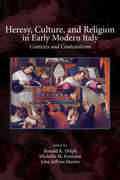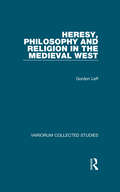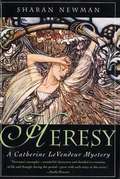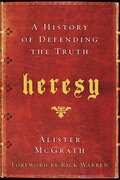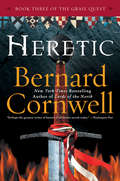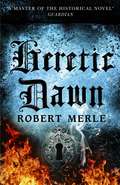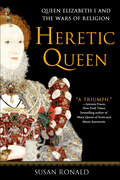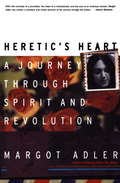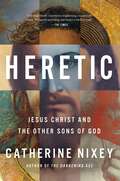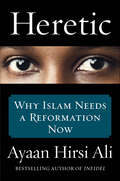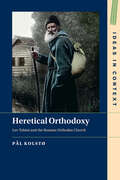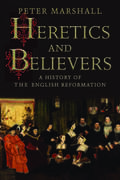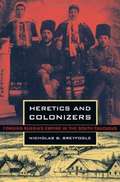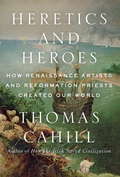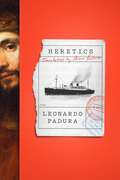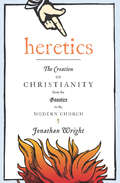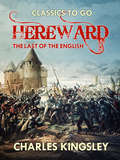- Table View
- List View
Heresy and Citizenship: Persecution of Heresy in Late Medieval German Cities (Studies in Medieval History and Culture)
by Eugene SmelyanskyHeresy and Citizenship examines the anti-heretical campaigns in late-medieval Augsburg, Rothenburg ob der Tauber, Strasbourg, and other cities. By focusing on the unprecedented period of persecution between 1390 and 1404, this study demonstrates how heretical presence in cities was exploited in ecclesiastical, political, and social conflicts between the cities and their external rivals, and between urban elites. These anti-heretical campaigns targeted Waldensians who believed in lay preaching and simplified forms of Christian worship. Groups of individuals identified as Waldensians underwent public penance, execution, or expulsion. In each case, the course and outcome of inquisitions reveal tensions between institutions within each city, most often between city councils and local bishops or archbishops. In such cases, competing sides used the persecution of heresy to assert their authority over others. As a result, persecution of urban Waldensians acquired meaning beyond mere correction of religious error. By placing the anti-heretical campaigns of this period in their socio-political and religious context, Heresy and Citizenship also engages with studies of social and political conflict in late medieval towns. It examines the role the exclusion of religiously and socially deviant groups played in the development of urban governments, and the rise of ideologies of good citizenship and the common good. It will be of interest to scholars and students interested in medieval urban and religious history, and the history of heresy and its persecution.
Heresy and Hussites in Late Medieval Europe (Variorum Collected Studies #1044)
by Thomas A. FudgeThe followers of the martyred Bohemian priest Jan Hus (1371-1415) formed one of the greatest challenges to the medieval Latin Church. Branded as heretics, outlawed, then forced to fight for their faith as well as their lives, the Hussites occupy one of the most colorful and challenging chapters of European religious history. The essays reprinted in this book (along with one here first published in English and additional notes) explore the essence of the early Hussite movement by focusing on the nature and development of heresy both as accusation and identity. Heresy and Hussites in Late Medieval Europe first examines the definition of heresy, and its comparative nature across Europe. It investigates the unique practices of popular religion in local communities, while examining theology and its unavoidable conflicts. The repressive policy of crusade and the growth of martyrdom with its inevitable contribution to the formation of Hussite history is explored. The social application of religious ideas, its revolutionary outcomes, along with the intentional use of art in pedagogy and propaganda, situates the Czech heretics in the fifteenth century. An examination of leading personalities, together with the eventual and more formal church administration, rounds out the study of this remarkable era.
Heresy and the Making of European Culture: Medieval and Modern Perspectives
by Andrew P. Roach James R. SimpsonScholars and analysts seeking to illuminate the extraordinary creativity and innovation evident in European medieval cultures and their afterlives have thus far neglected the important role of religious heresy. The papers collected here - reflecting the disciplines of history, literature, theology, philosophy, economics and law - examine the intellectual and social investments characteristic of both deliberate religious dissent such as the Cathars of Languedoc, the Balkan Bogomils, the Hussites of Bohemia and those who knowingly or unknowingly bent or broke the rules, creating their own 'unofficial orthodoxies'. Attempts to understand, police and eradicate all these, through methods such as the Inquisition, required no less ingenuity. The ambivalent dynamic evident in the tensions between coercion and dissent is still recognisable and productive in the world today.
Heresy and the Politics of Community: The Jews of the Fatimid Caliphate
by Marina RustowIn a book with a bold new view of medieval Jewish history, written in a style accessible to nonspecialists and students as well as to scholars in the field, Marina Rustow changes our understanding of the origins and nature of heresy itself. Scholars have long believed that the Rabbanites and Qaraites, the two major Jewish groups under Islamic rule, split decisively in the tenth century and from that time forward the minority Qaraites were deemed a heretical sect. Qaraites affirmed a right to decide matters of Jewish law free from centuries of rabbinic interpretation; the Rabbanites, in turn, claimed an unbroken chain of scholarly tradition. Rustow draws heavily on the Cairo Geniza, a repository of papers found in a Rabbanite synagogue, to show that despite the often fierce arguments between the groups, they depended on each other for political and financial support and cooperated in both public and private life. This evidence of remarkable interchange leads Rustow to the conclusion that the accusation of heresy appeared sporadically, in specific contexts, and that the history of permanent schism was the invention of polemicists on both sides. Power shifted back and forth fluidly across what later commentators, particularly those invested in the rabbinic claim to exclusive authority, deemed to have been sharply drawn boundaries. Heresy and the Politics of Community paints a portrait of a more flexible medieval Eastern Mediterranean world than has previously been imagined and demonstrates a new understanding of the historical meanings of charges of heresy against communities of faith. Historians of premodern societies will find that, in her fresh approach to medieval Jewish and Islamic culture, Rustow illuminates a major issue in the history of religions.
Heresy in Transition: Transforming Ideas of Heresy in Medieval and Early Modern Europe (Catholic Christendom, 1300-1700)
by Cary J. Nederman John Christian LaursenThe concept of heresy is deeply rooted in Christian European culture. The palpable increase in incidences of heresy in the Middle Ages may be said to directly relate to the Christianity's attempts to define orthodoxy and establish conformity at its centre, resulting in the sometimes forceful elimination of Christian sects. In the transition from medieval to early modern times, however, the perception of heresy underwent a profound transformation, ultimately leading to its decriminalization and the emergence of a pluralistic religious outlook. The essays in this volume offer readers a unique insight into this little-understood cultural shift. Half of the chapters investigate the manner in which the church and its attendant civil authorities defined and proscribed heresy, whilst the other half focus on the means by which early modern writers sought to supersede such definition and proscription. The result of these investigations is a multifaceted historical account of the construction and serial reconstruction of one of the key categories of European theological, juristic and political thought. The contributors explore the role of nationalism and linguistic identity in constructions of heresy, its analogies with treason and madness, the role of class and status in the responses to heresy. In doing so they provide fascinating insights into the roots of the historicization of heresy and the role of this historicization in the emergence of religious pluralism.
Heresy, Crusade, and Inquisition in Southern France, 1100 - 1250
by Walter L. WakefieldThis title is part of UC Press's Voices Revived program, which commemorates University of California Press’s mission to seek out and cultivate the brightest minds and give them voice, reach, and impact. Drawing on a backlist dating to 1893, Voices Revived makes high-quality, peer-reviewed scholarship accessible once again using print-on-demand technology. This title was originally published in 1974.
Heresy, Culture, and Religion in Early Modern Italy: Contexts and Contestations (Sixteenth Century Essays & Studies #76)
by Delph Fontaine MartinLeading scholars from Italy and the United States offer a fresh and nuanced image of the religious reform movements on the Italian peninsula in the sixteenth and seventeenth centuries. United in their conviction that religious ideas can only be fully understood in relation to the particular social, cultural, and political contexts in which they develop, these scholars explore a wide range of protagonists from popes, bishops, and inquisitors to humanists and merchants, to artists, jewelers, and nuns. What emerges is a story of negotiations, mediations, compromises, and of shifting boundaries between heresy and orthodoxy. This book is essential reading for all students of the history of Christianity in early modern Europe.
Heresy, Culture, and Religion in Early Modern Italy: Contexts and Contestations (Sixteenth Century Essays & Studies #76)
by Delph Fontaine MartinLeading scholars from Italy and the United States offer a fresh and nuanced image of the religious reform movements on the Italian peninsula in the sixteenth and seventeenth centuries. United in their conviction that religious ideas can only be fully understood in relation to the particular social, cultural, and political contexts in which they develop, these scholars explore a wide range of protagonists from popes, bishops, and inquisitors to humanists and merchants, to artists, jewelers, and nuns. What emerges is a story of negotiations, mediations, compromises, and of shifting boundaries between heresy and orthodoxy. This book is essential reading for all students of the history of Christianity in early modern Europe.
Heresy, Literature, and Politics in Early Modern English Culture
by David Loewenstein John MarshallThis interdisciplinary volume of essays brings together a team of leading early modern historians and literary scholars in order to examine the changing conceptions, character, and condemnation of 'heresy' in sixteenth- and seventeenth-century England. Definitions of 'heresy' and 'heretics' were the subject of heated controversies in England from the English Reformation to the end of the seventeenth century. These essays illuminate the significant literary issues involved in both defending and demonising heretical beliefs, including the contested hermeneutic strategies applied to the interpretation of the Bible, and they examine how debates over heresy stimulated the increasing articulation of arguments for religious toleration in England. Offering fresh perspectives on John Milton, Thomas Hobbes, John Locke and others, this volume should be of interest to all literary, religious and political historians working on early modern English culture.
Heresy, Philosophy and Religion in the Medieval West (Variorum Collected Studies)
by Gordon LeffThe papers in this volume fall into four sections. The first part deals more generally with heresy, religious movements and the Church, while the second focuses on Wyclif, covering his path to dissent, his religious doctrines, and a doctrinal comparison with Hus. Philosophical themes come to the fore in the third section, which has papers on the decline of scholasticism in the 14th century and on the trivium, and also includes hitherto unpublished essays on the theology of Augustine's two cities and on Ockham and nominalism. The final part, with another two papers published here for the first time, discusses Christian, Augustinian and Franciscan concepts of man, and the concepts of natural rights according to Ockham and the Franciscans.
Heresy: A Catherine LeVendeur Mystery
by Sharan Newman8th in the Catherine LeVendeur mystery series set in 12th-century France. Catherine and Margaret go to the council at Reims to defend Astrolabe against charges of murder.
Heresy: A History of Defending the Truth
by Alister E. McGrathIn Heresy, leading religion expert and church historian Alister McGrath reveals the surprising history of heresy and rival forms of Christianity, arguing that the church must continue to defend what is true about Jesus. He explains that remaining faithful to Jesus’s mission and message is still the mandate of the church despite increasingly popular cries that traditional dogma is outdated and restricts individual freedom.
Heretic (Grail Quest #3)
by Bernard CornwellAlready a seasoned veteran of King Edward's army, young Thomas of Hookton possesses the fearlessness of a born leader and an uncanny prowess with the longbow. Now, at the head of a small but able band of soldiers, he has been dispatched to capture the castle of Astarac. But more than duty to his liege has brought him to Gascony, home of his forebears and the hated black knight who brutally slew Thomas's father. It is also the last place where the Holy Grail was reported seen. Here, also, a beautiful and innocent, if not pious, woman is to be burned as a heretic. Saving the lady, Genevieve, from her dread fate will brand Thomas an infidel, forcing them to flee together across a landscape of blood and fire. And what looms ahead is a battle to the death that could ultimately shape the future of Christendom.
Heretic Dawn: Volume 3
by Robert Merle T. Jefferson Kline1572: Returning from his studies in Montpellier, Pierre de Siorac is ambushed by a jealous Périgord nobleman. A duel ensues, and Pierre must subsequently travel to Paris, to seek his pardon from the King. The capital city and the royal court are a disorienting new environment for Pierre: a world of sweet words and fierce pride, where coquettish smiles hide behind fans, and murderous intents behind elegant bows; a world of genteel tennis matches and deadly swordplay, whose elaborate social graces mask a simmering tension that will soon explode to engulf the entire city in one of history's most infamous bouts of butchery - and signal the dawn of a new and bloody era in the history of France.Here, Pierre faces the greatest challenge of his young existence - to make his way through this deceptively dangerous milieu, to win a royal pardon, and finally to escape from Paris with his life, and the lives of his beloved companions, intact.From the Trade Paperback edition.
Heretic Queen: Queen Elizabeth I and the Wars of Religion
by Susan RonaldAcclaimed biographer Susan Ronald delivers a stunning account of Elizabeth I that focuses on her role in the Wars on Religion—the battle between Protestantism and Catholicisim that tore apart Europe in the 16th CenturyElizabeth's 1558 coronation procession was met with an extravagant outpouring of love. Only twenty-five years old, the young queen saw herself as their Protestant savior, aiming to provide the nation with new hope, prosperity, and independence from the foreign influence that had plagued her sister Mary's reign. Given the scars of the Reformation, Elizabeth would need all of the powers of diplomacy and tact she could summon. Extravagant, witty, and hot-tempered, Elizabeth was the ultimate tyrant. Yet at the outset, in religious matters, she was unfathomably tolerant for her day. "There is only one Christ, Jesus, one faith," Elizabeth once proclaimed. "All else is a dispute over trifles." Heretic Queen is the highly personal, untold story of how Queen Elizabeth I secured the future of England as a world power. Susan Ronald paints the queen as a complex character whose apparent indecision was really a political tool that she wielded with great aplomb.
Heretic's Heart: A Journey Through Spirit and Revolution
by Margot AdlerStarting in 1964, writes Margot Adler in this dazzling memoir, "I found myself mysteriously at the center of extraordinary events." Now a correspondent for National Public Radio, Adler was a young woman determined to be taken seriously and to be an agent of change--on her own terms, free from dogma and authoritarian constraints. From campus activism at the University of California at Berkeley to civil rights work in Mississippi, from antiwar protests to observing the socialist revolution in Cuba, she found those chances in the 1960s. Heretic's Heart illuminates the events, ideas, passions, and ecstatic commitments of the decade like no other memoir. At the book's center is the powerful--and unique--correspondence between Adler, then an antiwar activist at Berkeley, and a young American soldier fighting in Vietnam. The correspondence begins when Adler reads a letter the infantryman has written to a Berkeley newspaper. "I've heard rumors that there are people back in the world who don't believe this war should be. I'm not positive of this though, 'cause it seems to me that if enough of them told the right people in the right way, then something might be done about it. . . . You see, while you're discussing it amongst each other, being beat, getting in bed with dark-haired artists . . . some people here are dying for lighting a cigarette at night." Heretic's Heart also explores Adler's attempt to come to terms with her singular legacy as the only grandchild of Alfred Adler, collaborator of Freud and founder of Individual Psychology, and as the daughter of a forceful beauty who bequeaths her spunk and adventurousness to her daughter, but whose overpowering personality forces Adler to strike out on her own. Adler's memoir marks an initiatory journey from spirit through politics and revolution back to spirit again. Revealing, funny, joyful, and often wise, Heretic's Heart will restore the spirit of the 1960s: the passion, the confusion, the sense of social transformation and limitless possibility, and the ecstatic feeling that the world is on the cusp of change.
Heretic: Jesus Christ and the Other Sons of God
by Catherine Nixey“Heretic has the mother lode of tales too hot for Christendom. Nixey has carefully wrung out a number of apocryphal texts for scandal.” —Harper's Magazine From a celebrated classicist and author of The Darkening Age (“[a] ballista-bolt of a book”—New York Times Book Review), a biography of the many, diverse variations of Jesus who thrived in early Christian traditions—and how they were lost until just one “true” Christ survived.Contrary to the teachings of the church today, in the first several centuries of Christianity’s existence, there was no consensus as to who Jesus was or why he had mattered. Instead, there were many different Christs. One had a twin brother and traveled to India; another consorted with dragons. One particularly terrifying Christ scorned his parents and killed those who opposed him.Moreover, in the early years of the first millennium there were many other saviors, many sons of gods who healed the sick and cured the lame. But as Christianity spread, they were pronounced unacceptable – even heretical – and they faded from view.Heretic unearths the different versions of Christ who existed in the minds of early Christians, and the process of evolution—and elimination—by which Jesus became the singular figure we know today. "A brilliant book—sometimes frightening, occasionally funny, frequently unsettling and always a thrill to read. It probes painfully into the pathology of belief." — The Times
Heretic: Why Islam Needs a Reformation Now
by Ayaan Hirsi AliContinuing her journey from a deeply religious Islamic upbringing to a post at Harvard, the brilliant, charismatic and controversial New York Times and Globe and Mail #1 bestselling author of Infidel and Nomad makes a powerful plea for a Muslim Reformation as the only way to end the horrors of terrorism, sectarian warfare and the repression of women and minorities.Today, she argues, the world’s 1.6 billion Muslims can be divided into a minority of extremists, a majority of observant but peaceable Muslims and a few dissidents who risk their lives by questioning their own religion. But there is only one Islam and, as Hirsi Ali shows, there is no denying that some of its key teachings—not least the duty to wage holy war—are incompatible with the values of a free society. For centuries it has seemed as if Islam is immune to change. But Hirsi Ali has come to believe that a Muslim Reformation—a revision of Islamic doctrine aimed at reconciling the religion with modernity—is now at hand, and may even have begun. The Arab Spring may now seem like a political failure. But its challenge to traditional authority revealed a new readiness—not least by Muslim women—to think freely and to speak out.Courageously challenging the jihadists, she identifies five key amendments to Islamic doctrine that Muslims have to make to bring their religion out of the seventh century and into the twenty-first. And she calls on the Western world to end its appeasement of the Islamists. “Islam is not a religion of peace,” she writes. It is the Muslim reformers who need our backing, not the opponents of free speech.Interweaving her own experiences, historical analogies and powerful examples from contemporary Muslim societies and cultures, Heretic is not a call to arms, but a passionate plea for peaceful change and a new era of global toleration. In the wake of the Charlie Hebdo murders, with jihadists killing thousands from Nigeria to Syria to Pakistan, this book offers an answer to what is fast becoming the world’s number one problem.
Heretical Orthodoxy: Lev Tolstoi and the Russian Orthodox Church (Ideas in Context)
by Pål KolstøLev Tolstoi was not only one of the world's most famous writers, he was also a deeply concerned thinker and hugely influential critic of the Church whose impact was felt long after his death. For an entire generation, Tolstoi set the agenda for ethical and religious thought, in Russia and beyond. Most of Tolstoi's main ideas drew on his Christian heritage – selected and creatively combined. While he claimed that his life's work consisted of rediscovering the pure doctrine of Christ as it had been before the Church perverted it, in fact he radically reinterpreted the Christian faith he had encountered in his own life, Russian Orthodoxy. This book offers a new and comprehensive account of Tolstoi's relationship with the Orthodox Church and its teachings, and shows how the Russian Church reacted to the “Tolstoi phenomenon” and attempted to counteract the influence of this new “heretic" - with scant success.
Heretics and Believers: A History of the English Reformation
by Peter MarshallA sumptuously written people’s history and a major retelling and reinterpretation of the story of the English Reformation Centuries on, what the Reformation was and what it accomplished remain deeply contentious. Peter Marshall’s sweeping new history—the first major overview for general readers in a generation—argues that sixteenth-century England was a society neither desperate for nor allergic to change, but one open to ideas of “reform” in various competing guises. King Henry VIII wanted an orderly, uniform Reformation, but his actions opened a Pandora’s Box from which pluralism and diversity flowed and rooted themselves in English life. With sensitivity to individual experience as well as masterfully synthesizing historical and institutional developments, Marshall frames the perceptions and actions of people great and small, from monarchs and bishops to ordinary families and ecclesiastics, against a backdrop of profound change that altered the meanings of “religion” itself. This engaging history reveals what was really at stake in the overthrow of Catholic culture and the reshaping of the English Church.
Heretics and Colonizers: Forging Russia's Empire in the South Caucasus
by Nicholas B. BreyfogleThe book explores the dynamic intersection of Russian borderland colonization and popular religious culture and reconstructs the story of the religious sectarians (Dukhobors, Molokans, and Subbotniks) who settled, either voluntarily or by force, in the newly conquered lands of Transcaucasia in the nineteenth century.
Heretics and Heroes: How Renaissance Artists and Reformation Priests Created Our World (The Hinges of History)
by Thomas CahillThe New York Times bestselling author of How the Irish Saved Civilization reveals how the innovations of the Renaissance and the Reformation changed the Western world. • &“Cahill is our king of popular historians.&” —The Dallas Morning News This was an age in which whole continents and peoples were discovered. It was an era of sublime artistic and scientific adventure, but also of newly powerful princes and armies—and of unprecedented courage, as thousands refused to bow their heads to the religious pieties of the past. In these exquisitely written and lavishly illustrated pages, Cahill illuminates, as no one else can, the great gift-givers who shaped our history—those who left us a world more varied and complex, more awesome and delightful, more beautiful and strong than the one they had found.
Heretics: A Novel
by Anna Kushner Leonardo Padura"Padura’s Heretics spans and defies literary categories . . . ingenious." —Maureen Corrigan, Fresh AirA sweeping novel of art theft, anti-Semitism, contemporary Cuba, and crime from a renowned Cuban author, Heretics is Leonardo Padura's greatest detective work yet.In 1939, the Saint Louis sails from Hamburg into Havana’s port with hundreds of Jewish refugees seeking asylum from the Nazi regime. From the docks, nine-year-old Daniel Kaminsky watches as the passengers, including his mother, father, and sister, become embroiled in a fiasco of Cuban corruption. But the Kaminskys have a treasure that they hope will save them: a small Rembrandt portrait of Christ. Yet six days later the vessel is forced to leave the harbor with the family, bound for the horrors of Europe. The Kaminskys, along with their priceless heirloom, disappear. Nearly seven decades later, the Rembrandt reappears in an auction house in London, prompting Daniel’s son to travel to Cuba to track down the story of his family’s lost masterpiece. He hires the down-on-his-luck private detective Mario Conde, and together they navigate a web of deception and violence in the morally complex city of Havana. In Heretics, Leonardo Padura takes us from the tenements and beaches of Cuba to Rembrandt’s gloomy studio in seventeenth-century Amsterdam, telling the story of people forced to choose between the tenets of their faith and the realities of the world, between their personal desires and the demands of their times. A grand detective story and a moving historical drama, Padura’s novel is as compelling, mysterious, and enduring as the painting at its center.
Heretics: The Creation of Christianity from the Gnostics to the Modern Church
by Jonathan WrightA lively examination of the heretics who helped Christianity become the world&’s most powerful religion. From Arius, a fourth-century Libyan cleric who doubted the very divinity of Christ, to more successful heretics like Martin Luther and John Calvin, this book charts the history of dissent in the Christian Church. As the author traces the Church&’s attempts at enforcing orthodoxy, from the days of Constantine to the modern Catholic Church&’s lingering conflicts, he argues that heresy—by forcing the Church to continually refine and impose its beliefs—actually helped Christianity to blossom into one of the world&’s most formidable religions. Today, all believers owe it to themselves to grapple with the questions raised by heresy. Can you be a Christian without denouncing heretics? Is it possible that new ideas challenging Church doctrine are destined to become as popular as Luther&’s once-outrageous suggestions of clerical marriage and a priesthood of all believers? A delightfully readable and deeply learned new history, Heretics overturns our assumptions about the role of heresy in a faith that still shapes the world. &“Wright emphasizes the &‘extraordinarily creative role&’ that heresy has played in the evolution of Christianity by helping to &‘define, enliven, and complicate&’ it in dialectical fashion. Among the world&’s great religions, Christianity has been uniquely rich in dissent, Wright argues—especially in its early days, when there was so little agreement among its adherents that one critic compared them to a marsh full of frogs croaking in discord.&” —The New Yorker
Hereward the Last of the English (Classics To Go)
by Charles KingsleyHereward, the Last of the English is an 1866 novel by Charles Kingsley. It tells the story of Hereward, a historical Anglo-Saxon figure who led resistance against the Normans from a base in Ely surrounded by fen land. It was Kingsley's last historical novel, and was instrumental in elevating Hereward into an English folk-hero. (Excerpt from Wikipedia)
